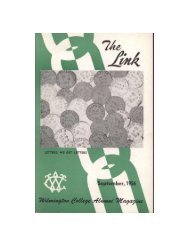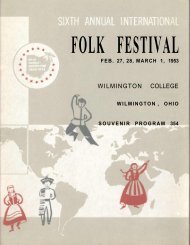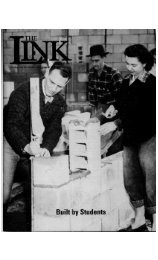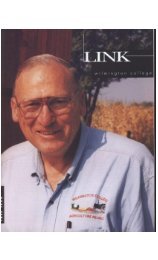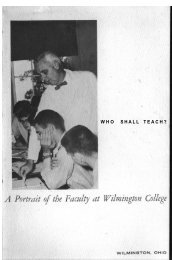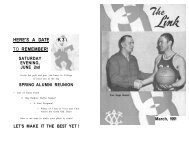The Link 1999 4 Vol.pdf - DRC Home - Wilmington College
The Link 1999 4 Vol.pdf - DRC Home - Wilmington College
The Link 1999 4 Vol.pdf - DRC Home - Wilmington College
You also want an ePaper? Increase the reach of your titles
YUMPU automatically turns print PDFs into web optimized ePapers that Google loves.
Soldiers of Peace<br />
Symposium Highlights War<br />
Resisters' Role in WWII Legacy<br />
A virtually unknown part of the World<br />
War II story is that of the war resisters<br />
whose pacifist convictions resulted in their<br />
incarceration while the world witnessed the<br />
horrors of a global conflagration.<br />
Larry Gara, <strong>Wilmington</strong> <strong>College</strong>'s emeritus<br />
professor of history, was one of those<br />
men whose nonviolent, pacifist convictions<br />
prohibited him from participating<br />
in any manner with the United<br />
States' war effort in response to German<br />
and Japanese aggression.<br />
<strong>The</strong>re were others.<br />
Indeed, some 6,000 avowed war resisters<br />
were imprisoned during the Second World<br />
War. A microcosm of their plight can be<br />
found in the stories of 10 resisters featured<br />
in the newly published book, A Few Small<br />
Candles: War Resisters of World War II Tell<br />
<strong>The</strong>ir Stories (Kent State University Press).<br />
A Few Small Candles, which was edited<br />
by Gara and his wife, Lenna Mae, chronicles:<br />
the circumstances that led to the resisters'<br />
resistence of military service, their terms in<br />
prison during the war years and how those<br />
experiences have shaped the subsequent 50 -<br />
plus years of their lives.<br />
Seven of the men featured in the book<br />
attended a reunion in <strong>Wilmington</strong> in April,<br />
the featured event of which was a Global<br />
Issues Symposium before an attentive, standing<br />
- room - only audience in the McCoy<br />
Room. <strong>The</strong> event was covered by C - SPAN<br />
Network, which plans to broadcast it May<br />
29 and 30 on C - SPAN IPs Book TV<br />
program.<br />
<strong>The</strong> seven book contributors who participated<br />
in the symposium were: Gara,<br />
4 SPRING <strong>1999</strong><br />
David Dellenger (also a defendant in the<br />
celebrated Chicago Seven trial), Ralph<br />
DiGia, Arthur A. Dole, John Harvey Griffith,<br />
George M. Houser and Lawrence H.<br />
Templin.<br />
Gara said the war resisters are all dedicated<br />
to nonviolence as an "active force" in<br />
resisting violence—and that concept goes<br />
well beyond the flash point that was World<br />
War II.<br />
"It's not only a question of being opposed<br />
to war, but being opposed to injustice,"<br />
said Houser, a white man who was a<br />
founder of the Congress of Racial Equality<br />
(CORE) in the early 1940s. <strong>The</strong> group engaged<br />
in nonviolent, direct action—sit - ins,<br />
protests and boycotts—as it demanded justice<br />
and civil rights for black Americans.<br />
"It was long before Martin Luther King<br />
and the Montgomery bus boycott," he said.<br />
"We inaugurated the first freedom rides and<br />
we began to shake the foundations of Jim<br />
Crow (laws)."<br />
Even in prison during the war, many of<br />
the resisters were fighting for social change.<br />
DiGia recalled he and other war resisters in<br />
federal prison held a hunger strike protesting<br />
segregation of the prisons' dining halls.<br />
<strong>The</strong> strike was a success and inmates of all<br />
races became more integrated.<br />
"<strong>The</strong>re weren't many victories in prison,<br />
but this was one," DiGia said.<br />
"At that time, everything in the federal<br />
government was segregated, including prisons<br />
and the army," added Gara, who also<br />
was active in promoting equal treatment for<br />
incarcerated African - Americans. "We tried<br />
to do something about it in our own way."<br />
"Social change will not come unless you<br />
live it," Dellenger said. "Who will be the<br />
Rosa Parks of this generation? I think there<br />
is more hope than people realize."<br />
Templin said seeking to change minds<br />
and laws by nonviolent means is a "revolution,"<br />
and he cites the examples Gandhi and<br />
the American Civil Rights Movement.<br />
"Fighting back is the whole point of nonviolence."<br />
Griffith looked at the history of violent<br />
conflict from a perspective as old as time<br />
and as vast as the universe. "From the Big<br />
Bang to the present, there is nothing disconnected—we're<br />
all connected.<br />
"If A hurts B, then B is apt to return hurt<br />
to A or C," he said. "<strong>The</strong> good news is the<br />
reverse—compassion—also works. I will<br />
try to not pass on hurt. I will try to pass on<br />
compassion."<br />
That poses the question: Can nonviolence<br />
work in a world with people like<br />
Hitler, Stalin, Saddam Hussein and<br />
Milosevic? What would have happened if<br />
the United States had not entered World<br />
War II? <strong>The</strong>ir answers were philosophical<br />
and spiritual in nature.<br />
"I don't think a pacifist has to have an<br />
answer for every war situation," Houser<br />
said. "Hurting does not cure hurting; healing<br />
does."<br />
As a start, he said people have to believe<br />
in the "possibility" of peace, freedom and<br />
justice even in the most impossible circumstances.<br />
If that belief is manifested by the<br />
masses into nonviolent action, the hope is it<br />
will spread throughout the world and eventually<br />
prohibit tyrants from coming to power<br />
in the first place.<br />
As Gara said, "Our message is one of<br />
hope—that there are alternatives to<br />
violence!"<br />
— Randy Sarvis



